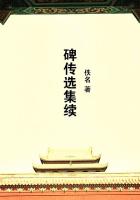And who is so foolish as to suppose that the things offered to God are needed by Him for some uses of His own? Divine Scripture in many places explodes this idea.Not to be wearisome, suffice it to quote this brief saying from a psalm: "I have said to the Lord, Thou art my God: for Thou needest not my goodness."(1)We must believe, then, that God has no need, not only of cattle, or any other earthly and material thing, but even of man's righteousness, and that whatever right worship is paid to God profits not Him, but man.For no man would say he did a benefit to a fountain by drinking, or to the light by seeing.And the fact that the ancient church offered animal sacrifices, which the people of God now-a-days read of without imitating, proves nothing else than this, that those sacrifices signified the things which we do for the purpose of drawing near to God, and inducing our neighbor to do the same.A sacrifice, therefore, is the visible sacrament or sacred sign of an invisible sacrifice.
Hence that penitent in the psalm, or it may be the Psalmist himself, entreating God to be merciful to his sins, says, "If Thou desiredst sacrifice, I would give it: Thou delightest not in whole burnt-offerings.The sacrifice of God is a broken heart: a heart contrite and humble God will not despise."(2) Observe how, in the very words in which he is expressing God's refusal of sacrifice, he shows that God requires sacrifice.He does not desire the sacrifice of a slaughtered beast, but He desires the sacrifice of a contrite heart.Thus, that sacrifice which he says God does not wish, is the symbol of the sacrifice which God does wish.God does not wish sacrifices in the sense in which foolish people think He wishes them, viz., to gratify His own pleasure.For if He had not wished that the sacrifices He requires, as, e.g., a heart Contrite and humbled by penitent sorrow, should be symbolized by those sacrifices which He was thought to desire because pleasant to Himself, the old law would never have enjoined their presentation; and they were destined to be merged when the fit opportunity arrived, in order that men might not suppose that the sacrifices themselves, rather than the things symbolized by them, were pleasing to God or acceptable in us.
Hence, in another passage from another psalm, he says, "If I were hungry, I would not tell thee; for the world is mine and the fullness thereof.Will I eat the flesh of bulls, or drink the blood of goats?"(3) as if He should say, Supposing such things were necessary to me, I would never ask thee for what I have in my own hand.
Then he goes on to mention what these signify:
"Offer unto God the sacrifice of praise, and pay thy vows unto the Most High.And call upon me in the day of trouble: I will deliver thee, and thou shall glorify me."(4) So in another prophet:
"Wherewith shall I come before the Lord, and bow myself before the High God? Shall I come before Him with burnt-offerings, with calves of a year old? Will the Lord be pleased with thousands of rams, or with ten thousands of rivers of oil? Shall Igive my first-born for my transgression, the fruit of my body for the sin of my soul? Hath He showed thee, 0 man, what is good; and what doth the Lord require of thee, but to do justly, and to love mercy, and to walk humbly with thy God?"(5) In the words of this prophet, these two things are distinguished and set forth with sufficient explicitness, that God does not require these sacrifices for their own sakes, and that He does require the sacrifices which they symbolize.In the epistle entitled "To the Hebrews"it is said, "To do good and to communicate, forget not:
for with such sacrifices God is well pleased."(6) And.so, when it is written," I desire mercy rather than sacrifice,"(7) nothing else is meant than that one sacrifice is preferred to another; for that which in common speech is called sacrifice is only the symbol of the true sacrifice.Now mercy is the true sacrifice, and therefore it is said, as I have just quoted, "with such sacrifices God is well pleased." All the divine ordinances, therefore, which we read concerning the sacrifices in the service of the tabernacle or the temple, we are to refer to the love of God and our neighbor.For "on these two commandments," as it is written, "hang all the law and the prophets."(8)CHAP.6.--OF THE TRUE AND PERFECT SACRIFICE.















